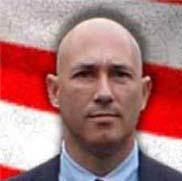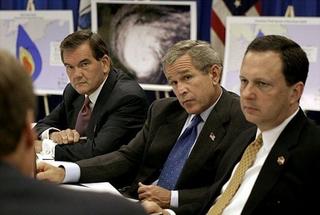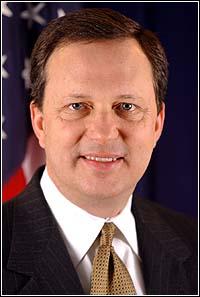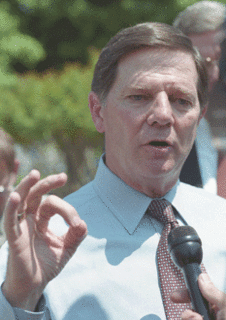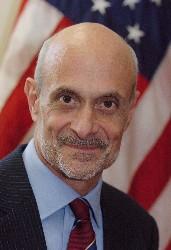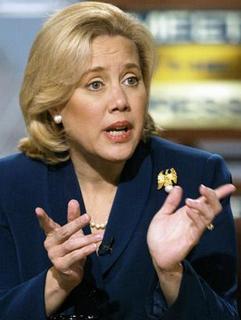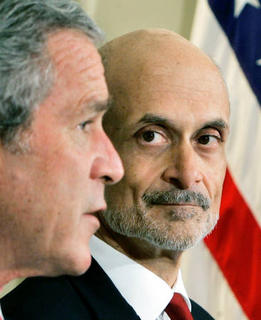More on Brownie's padded resume
From LA Times:
Dishonesty May Have Been Last Straw
The FEMA director is sent back to Washington after discrepancies on his resume surface. For Bush, replacing an official is a rare move.By Maura Reynolds and Ken SilversteinTimes Staff WritersSeptember 10, 2005WASHINGTON — For more than a week, President Bush withstood mounting pressure to fire Michael D. Brown, the director of the Federal Emergency Management Agency. But it was not until revelations that Brown might have misrepresented his qualifications on his resume that the president took the rare step of removing an aide from his responsibilities.Brown's unceremonious recall to Washington on Friday suggested to some that for the Bush administration, Brown's real error might not have been FEMA's inadequate response to the hurricane but dishonesty."The Bush people do not look kindly on someone leading them mildly astray, which is what his resume did," said David Gergen, who has advised Republican and Democratic administrations on crisis management. "The code is: 'You be straight with us and work hard, and we'll be loyal to you.' And he violated the code." Bush is known for his allegiance to his staff, and Brown, a former Republican Party official, is one of only a few senior aides moved aside in the five years of his presidency. Two others, former White House economic advisor Lawrence B. Lindsey and former Treasury Secretary Paul H. O'Neill, were forced to resign in the president's first term after they made public comments that were perceived as disloyal to the president.Brown has been directed to return to administering FEMA nationally. And it may have been Brown's loyalty to the president that saved him from being fired outright as the crisis in the Gulf Coast worsened. But Washington observers said removing him from directing operations in the hurricane zone demonstrated a lack of confidence that was the equivalent of sacking him. "When you get a sign like this, it's only a matter of time until he resigns," said Republican consultant Glen Bolger. "Even though it runs against the president's nature to do it, this is a recognition that Brown didn't have anybody's confidence to get the problems fixed." Pressure from Democrats was not a critical factor, Republicans said. It was that fellow Republicans — many from hurricane-prone states such as Florida — privately pleaded with the White House to remove Brown. They told him Brown had been ineffective in past rescue efforts, and no one in the region had confidence in his ability to manage.There was a "lot of discontent" about Brown's leadership, said Rep. Jeff Flake (R-Ariz.). "A lot of folks the White House and the president trust were calling and expressing a lack of confidence," Bolger said. "It's not [House Minority Leader] Nancy Pelosi who has that kind of influence." Moreover, the resume scandal appeared to give the president additional cover for taking action against Brown. Charles Cook, an independent Washington political analyst and editor of the Cook Political Report, said the allegations of dishonesty helped the president avoid acknowledging that he hired the wrong person. "This is a president who doesn't like to admit mistakes, and hiring Brown was obviously a mistake," Cook said. "This was a way to not run him out of town on a stake but still get him out of town." The resume allegations surfaced late Thursday when Time magazine reported on its website that Brown appeared to have misrepresented his employment history. For instance, the resume he submitted for his 2002 Senate confirmation hearing lists him as serving as "assistant city manager, police, fire and emergency services" in the 1970s for the city of Edmond, Okla. But according to Edmond spokeswoman Claudia Deakins, city records list his title as "assistant to the city manager." Bill Dashner, the former Edmond city manager to whom Brown reported, said Brown exercised "no authority or power." "He was an administrative assistant," Dashner told The Times in a telephone interview from Las Vegas, where he has retired. "He had nothing to do with emergency services. He did what I told him to do. I'd say, 'Mike, do this,' and he'd report back." "I feel sorry for him," Dashner added. "But, dammit, when you submit a resume, you don't put a lie in it, especially when you're going to work for the president of the United States." A second allegation involves a copy of Brown's resume posted on Findlaw.com, stating he earned an award as "outstanding political science professor, Central State University." Charles Johnson, a spokesman for the university, now known as University of Central Oklahoma, said the institution has turned up no records that he was a faculty member. But he could not rule out that Brown may have been an adjunct instructor. Officials were searching off-campus records to find out."As far as I know, we have no record of his being a professor here," Johnson said.The Findlaw resume also states that Brown served as "director, Oklahoma Christian Home … 1983-present." An official at the Edmond, Okla., nursing home's administrative office, said she did not remember him and said a search of board records found only one reference. "Today, I dug through all our materials, board minutes and correspondence, and found that he was on the board but only attended one meeting, in January of 1986," said the employee, who spoke on condition of anonymity.FEMA released a statement late Friday disputing the Time report, alleging it "is based on online information Mr. Brown has never seen." "Mike Brown did serve as an adjunct professor of law at Oklahoma City University, was named an outstanding political science senior at the University of Central Oklahoma, was a member of the development committee on the board of directors for the Oklahoma Christian Home, and did serve as assistant to the city manager of Edmond, Okla.," the statement said.FEMA did not offer an explanation for the discrepancies between Brown's official resume and the agency's description of his professional experience. A spokesman for Findlaw said the company posts resumes supplied by the subject or their employer. "The information in Brown's attorney profile originally came from Mr. Brown or a delegate or the firm he was with," said Kyle Christensen. He said Brown's directory listing was placed in August 1997 and last updated in January 1998. Political observers said it was too soon to judge the seriousness of the resume discrepancies. But the allegations were more than enough to serve as the last straw after rising complaints. If nothing else, Cook said, the focus on Brown's resume revealed that even if completely accurate, it was thin on experience in emergency management. He added that Brown's main qualification was years of service with the Republican Party. "FEMA had become a dumping ground for political hacks," Cook said. "It exposed that for all the world to see."
Times staff writer Richard Simon contributed to this report.
